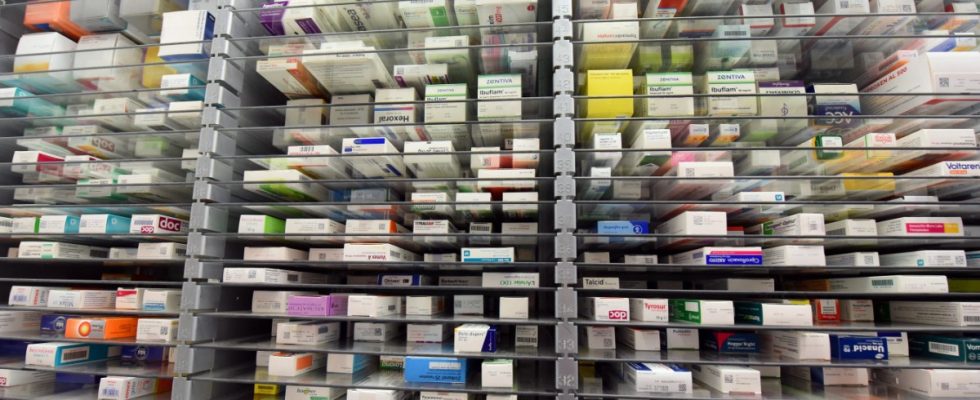The law to curb supply bottlenecks for certain generic drugs will not ease the supply in the short term. This is the result of a study by the Pro Generics Association. He represents the manufacturers of generic drugs, they imitate drugs whose patents have expired. In the past few months there have been repeated supply bottlenecks, in some cases the Federal Ministry of Health in Berlin even declared a supply shortage, which allows special measures to defuse the situation. For example, the authorities may permit the import of medicines that are not approved in Germany.
Measured against the absolute number of active ingredients, supply shortages are very rare. However, they often have serious consequences for millions of patients. In February 2022, for example, the ministry reported a shortage of drugs containing the active ingredient tamoxifen, which are used to treat breast cancer. What everyone who has to care for a sick infant or a sick child has been feeling for months resulted in another announcement about a month ago. The ministry found that there was a shortage of juices containing antibiotics for children. Since autumn 2022, the Federal Institute for Drugs and Medical Devices (Bfarm) has received increasing reports of delivery bottlenecks.
The manufacturers have long identified the reason for the poor supply. The generics market is completely regulated by the state, says Andreas Burkhardt, CEO of Pro Generika and Germany boss of the generics manufacturer Teva in an SZ interview. There are fixed amounts, discount agreements, the price moratorium, the 4-G rule. “Everything has been done to lower the prices,” said the manager. Federal Minister of Health Karl Lauterbach also knows that something went wrong: “We also overdid it with economization in the supply of medicines.”
A more stable supply costs money
The law to combat delivery bottlenecks in off-patent medicines and to improve the supply of children’s medicines, ALBVVG for short, is intended to alleviate this. The draft has been available since April. This Wednesday, it is to be debated for the first time in the German Bundestag. Among other things, the draft stipulates that the price rules for children’s medicines will be relaxed and that health insurance companies will have to take into account antibiotics with active ingredient production in the European Economic Area when tendering contracts.
Thomas Weigold, he sits on the board of Pro Generika and is the managing director of Sandoz Germany, sees good approaches in the ALBVVG. However, the draft does not go far enough for him because it only covers a few active ingredients. “It cannot have a quick and major impact,” Weigold said in a virtual press conference on Tuesday. An active ingredient such as tamoxifen, for example, and other cancer drugs would not be recorded. And even if there are no fixed amounts, price increases are often not possible due to existing discount agreements with health insurance companies. The ALBVVG may prevent existing production of active ingredients covered by the law from moving away, but it “certainly” does not induce any manufacturer to bring production back from China or India. Current problems, such as the sharp rise in production costs, are not addressed at all.
On behalf of Pro Generika, the consulting firm Mundicare calculated what it would cost to make the supply more resilient. The result of the study, which was presented on Tuesday, can be summarized as follows: A more stable supply costs money. The companies would have to invest – sometimes more, sometimes less.
The consultants have calculated alternatives. The study estimates the costs for including other suppliers, for example for active ingredients, at 150,000 to 200,000 euros. This would increase manufacturing costs by 13 to 19 percent, says Andreas Meiser, a partner at Mundicare. The most expensive – between 150 and 250 million euros – would be to set up or buy your own production for active ingredients in Europe. Manufacturing costs would increase by 11 to 15 percent. Such a measure can be implemented in the long term, within three to five years.
Penicillin provider complains about rising costs and falling prices
The German manufacturer Infectopharm expressed its anger in an open letter months ago. Addressed is the Email dated November 29, 2022 to Karl Lauterbach and some other healthcare professionals. The family company from Heppenheim specializes in medicines for children. It also offers antibiotic juices with various active ingredients, including amoxicillin and penicillin. In the past few weeks, the Bfarm has reported delivery bottlenecks several times.
In the e-mail, Infectopham criticized that since the mid-1990s, more and more of his antibiotic juices have been “fixed price”. While the company’s own sales prices “only went down”, the costs had risen. Infectopharm has been selling its amoxicillin juice Infectomox 250 in a 100 milliliter bottle since 2010 at a net price of 1.65 euros. “This price can no longer be represented economically.” In the e-mail, the company also announces price increases beyond the fixed amount.
Infectopharm describes its view of things on its website. In the winter of 2022/23, the demand for penicillin juices, for example, increased significantly because of the “extraordinarily high number of infections with respiratory problems”. From October 2022 to March 2023, Infectopharm delivered 750,000 packs of penicillin juice, “far more than usual in a whole year”. More and more suppliers of antibiotics have withdrawn from the market. “In 2003 there were eleven suppliers of penicillin juices, now only two,” says the website. One of them is yourself. In order to relax the situation in the long term and make the market attractive for other pharmaceutical companies, the ALBVVG requires “more than just cosmetic interventions”. Important is the “courageous therapy of a completely sick system”.

